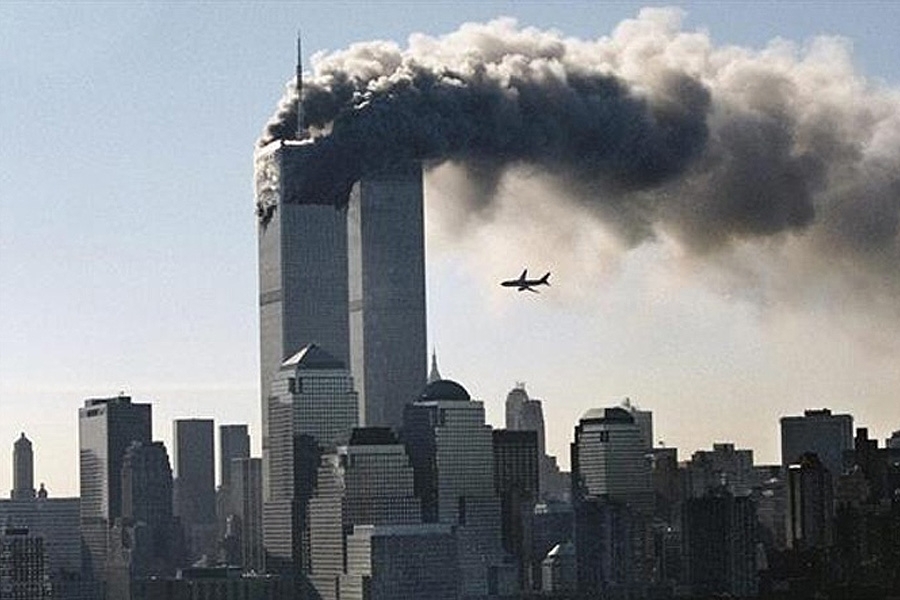The world watched in horror as the terrorist attack on September 11, 2001, killed nearly 3,000 people when al Qaeda hijackers crashed airliners into the Twin Towers in New York, the Pentagon, and a field in Pennsylvania. It was the deadliest attack on American soil. It changed everything from airport security to the spread of news and disinformation to the threat of terrorism and the situation in Afghanistan.

The world watched in horror as the terrorist attack on September 11, 2001, killed nearly 3,000 people when al Qaeda hijackers crashed airliners into the Twin Towers in New York, the Pentagon, and a field in Pennsylvania. It was the deadliest attack on American soil. It changed everything from airport security to the spread of news and disinformation to the threat of terrorism and the situation in Afghanistan.

Twenty-two years later, despite all the information received, there are still conspiracy theories in the United States about who is behind the terrorist attacks, whether the leader Osama Bin Laden was killed, and whether America itself carried out the attacks to start the war in the Middle East in an attempt to replenish its oil reserves.
On the other hand, some world media still write that the truth about the attacks is still hidden among conspiracy theories, myths, and fake news, but also manipulative content, which for many, especially for the relatives of those who died in the terrible event, is still painful today because the fact that they are convinced that many data of the American government are being hidden from the public for currently unknown reasons.
But at the same time, it is interesting that even more than two decades after the fateful day of September 11, 2001, the so-called "war on terrorism" remains incomprehensible to many. However, the United States and its allies achieved important victories and a series of changes. The Taliban movement in Afghanistan, which was ousted in 2001 by a joint mission of the United States and the current Afghan government, is insurgent again.
It is now waning in Iraq after the 2003 US-led invasion that ousted Saddam Hussein and the civil war that threatened to tear the country apart. But a stable government and security for all citizens remain distant goals the country strives for. In America itself, the sense of relief that the country has gone two decades without being the target of a significant terrorist attack seems to be mixed with disillusionment at the economic, political, and individual costs of the global war against a mysterious enemy, the pandemic and now the events in Ukraine.
On September 11, 2001, after the first plane hit the World Trade Center, people were mostly glued to their televisions or the radio to get the latest news about the attacks. Today, other means and platforms have pushed those two media aside. Word now spreads quickly through websites, social networks, and text messages on cell phones.
"Back then, social media platforms werent widely adopted, and who even knew what a tweet was at a time when most people still relied on their home phone service," wrote Darrell West and Nicole Turner-Lee of the Brookings Institution in Washington, adding that then the world had problems how to check the information at the same time.
"But countless platforms open the door to misinformation on this topic." Just imagine the malice that could be created for an attack like that of 9/11 in the age of social media. "There would be immediate speculation about what happened and who is responsible," RFE states in its topic analysis.
Interestingly, even after so many years, they are still current proponents of theses and myths worldwide. Over the years, the worlds major media outlets have published stories, movies, and even a list of myths and lies that have been promoted about the attacks in the United States.
Today, many people say that if you look at the impact video, you will see that the buildings have collapsed, and for that, it is not necessary to use a large amount of explosives but to place the explosives in the right places. So it is believed that someone had much access to both buildings and time to do it. But this theory begs the question: Why were airplanes needed?
Investigations found that it was clear that the structures of the buildings had been weakened by the fire caused by the aircraft and had fallen due to the floors collapse. Despite this, people refuse to believe that version.
Some relatives of those who died that day are still trying to get essential evidence and information from the authorities. A 2016 study found that more than half of Americans believe the government covered up information about the 9/11 attacks. Some data is missing, and some parts of US government reports have been redacted and manipulatively communicated to the public for years.
Others believe the government deliberately allowed the attacks or was even involved in planning them. Experts say that part of these conspiracy theories results from what people hear - that a small group of people use a weak weapon to cause such a cataclysm. Its only natural that when something important happens, people want to hear an explanation, experts say. Often, official descriptions are insufficient and unsatisfactory for people, so there is a series of versions and the creation of conspiracy theories, which people share with similar opinions about the situation.
But in the last two decades, some people have argued otherwise. For example, if you type "9-11" into search websites, one of the five choices listed is - "9-11" conspiracy. One of the most bizarre conspiracy theories ever is the accusation that the US attacked itself or that Israel carried out the attacks in a concerted effort to discredit Muslims.
In 2008, scientists from the Program on International Political Behavior surveyed people in 21 countries worldwide, asking them who they thought was behind the September 11, 2001, attacks. The answers surprised Program Director Stephen Cool.
"Only half of them had a majority opinion that Al Qaeda was involved in some way." Even among countries like our NATO allies, there was sometimes no majority opinion, with more than two-thirds thinking otherwise. So what we have here is a lack of consensus in the world on this issue," Kuhl says.
Those with a generally more negative attitude were less likely to believe al-Qaeda carried out the attacks, Cool said. Grimm Bannerman, a former Senate Foreign Relations Committee member, says the studys findings would have differed in the immediate aftermath of the 9/11 attacks.
"I think the rest of the world supported us in the beginning. It was as if everyone was American then—even people who wouldnt normally be best friends. Were with you, we understand what youre going through, that was the relationship," Bannerman said.
He added, however, that the United States lost much of this so-called "goodwill" when it went to war in Iraq, a country most believe was not involved in the September attacks.
After the US-Iraq war, the negative attitude towards the US in Muslim countries increased significantly. In 2008, a majority of respondents in Middle Eastern countries said that either al-Qaeda was not responsible for the 9/11 attacks or that they did not know who was behind them.
According to a Pew Center survey this year, most Muslims polled still do not believe Arabs are responsible for the attacks.
Experts add that it is possible to improve the situation. According to them, the withdrawal of the US military from Afghanistan and less involvement in Muslim regions, combined with increased trade and aid, will likely result in a change in attitude towards Washington, with a chance to put aside some of the more bizarre theories about the terrorist attacks on the US by 11 September 2001
However, today, when the 22nd anniversary of the attack approaches, many media still claim that manipulative content and untruths on the Internet distort the global picture regarding the terrorist attacks on the USA in 2001.
Author: Dejan Srbinovski
North Macedonian Media Partner Link: https://www.slobodenpecat.mk/po-povekje-od-dve-dekadi-vistinata-za-9-11-pomegju-teoriite-na-zagovor-i-lazhnite-vesti/
In all societies there are issues that are rather being skipped. Certain...
The neoliberal path, started in 2001, has led to especially bad results in Serbi...
For centuries, the region was subsumed within the Ottoman and Hungarian Empires,...
"Serbia has returned to the systemic and anti-systemic position of the political...
In reality, Serbia is closer than ever to NATO. In the course of the last five y...